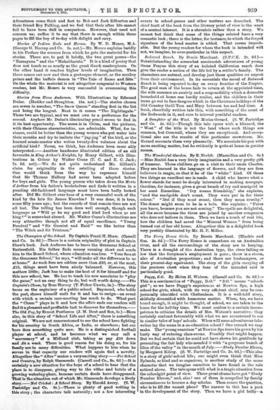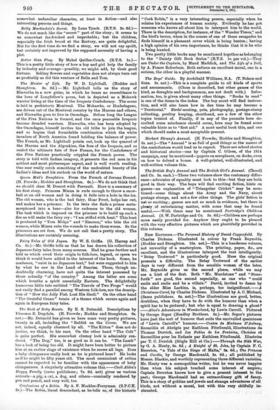Peggy, B.G. By Helen H. Watson. (Cassell and Co. 3s.
6d.)— This is a continuation of "Peggy, D.O." " S.G." means "school- girl"; so we have Peggy's experiences at Newton Spa, a high school for girls, which, with its very efficient chief, may be con- jecturally identified with Cheltenham. It is a well-told story, skilfully •diversified with humorous matter. When, too, we have heard enough, it might be thought, of school, we are taken to the home for the holiday time. We must confess to a certain incom- petence to criticize the details of Mrs. Watson's narrative : they certainly contrast favourably with what we are accustomed to see in similar tales of boys' schools. When will some adventurous tale- writer lay the scene in a co-education school ? One remark we may make. The " young examiner " at Newton Spa tears his gown by his hasty way of entering class-rooms. Possibly that might happen. But we feel certain that he could not have shown his gratitude by presenting the fair lady who mended it with "a gorgeous bunch of lilies of the valley " in the month of July. Study Number Eleven, by Margaret Kilroy. (S. W. Partridge and Co. 28. 6d.)—This also is a story of girls'-school life ; one might even think that Miss Rylands, so kind and so sagacious, is another study of the same character that we imagine ourselves to have found in the tale noticed above. The tale opens with what is a tragic situation from the schoolgirl point of view. Three great chums have got " Study Number Eleven," and, alas ! one of them is compelled by family circumstances to become a day scholar. Then comes the question, who is to fill the vacant place? The answer to this has a part in the development of the story. Then we have a girl bully—a
somewhat unfamiliar character, at least in fiction—and also interesting persons and things.



































































 Previous page
Previous page